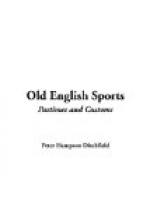A good sound ash-stick with a large basket handle was the weapon used, very similar to, but heavier and shorter than an ordinary single-stick. The object is to “break the head” of the opponent— i.e. to cause blood to flow anywhere above the eyebrow. A slight blow will often accomplish this, so the game is not so savage as it appears to be. The play took place on a stage of rough planks about four feet high. Each player was armed with a stick, looping the fingers of his left hand in a handkerchief or strap, which he fastened round his left leg, measuring the length, so that when he drew it tight with his left elbow up he had a perfect guard for the left side of his head.[14] Guarding his head with the stick in his right hand, he advanced, and then the fight began; fast and furious came the blows, until at last a red streak on the temple of one of the combatants declared his defeat. The Reading Mercury of May 24, 1819, advertised the rural sports at Peppard, when the not very magnificent prize of eighteenpence was offered to every man who broke a head at cudgel-play, and a shilling to every one who had his head broken.
Such was the sport which our old Berkshire rustics delighted in. Back-sword play, wrestling, and other pastimes made them a hardy race, full of courage, and developed qualities which it is hoped their descendants have not altogether lost. The gallant Berkshire Regiment, which fought so bravely at Maiwand, is composed of the sons of those who used to wield the back-sword on the Berkshire downs, and showed themselves not unworthy of their ancestry, although the quarter-staff and ashen-swords are forgotten. The old village feasts are forgotten too—more’s the pity. Then old quarrels were healed, old bitternesses removed: aged friends met, and became young again in heart, as they revived old memories and sweet recollections of youthful days. Rich and poor, the squire and the farmer, the farmer and his labourers, all mingled together, class with class; and good-fellowship, harmony, and mutual confidence were promoted by these annual gatherings. It is true that these village feasts degenerated, because the well-to-do folk abstained from them; but would it not be possible to revive them, to preserve the good which they certainly did, and to eliminate the evil which is so often mingled with the good? Such a consideration is worthy of the attention of all who have the welfare of the people at heart.




